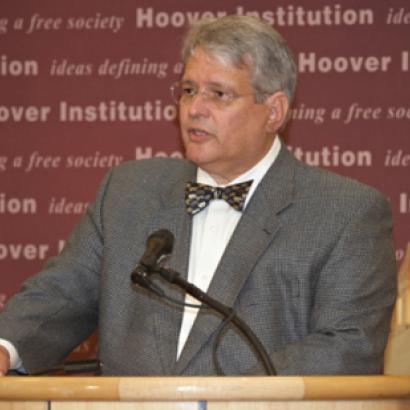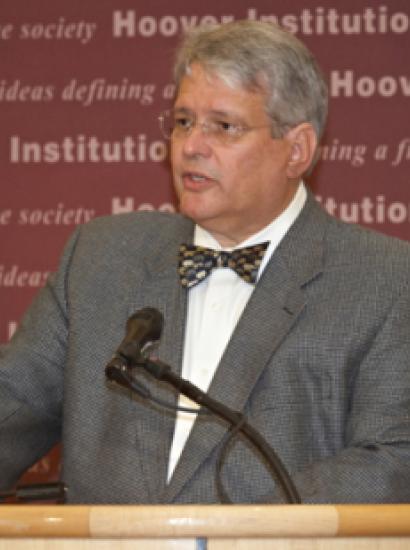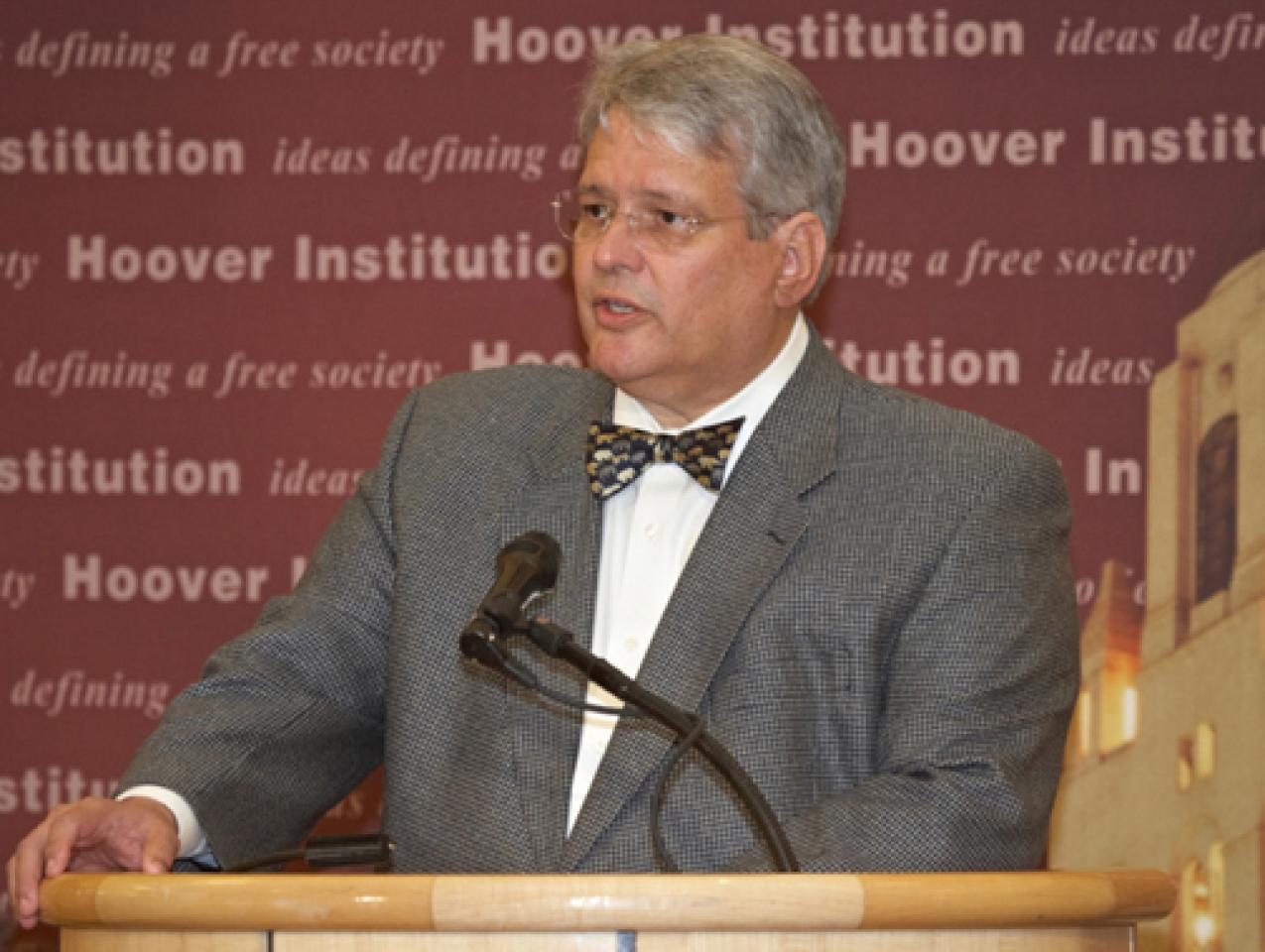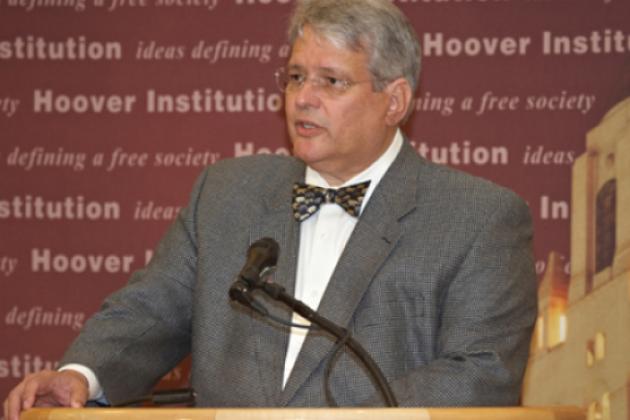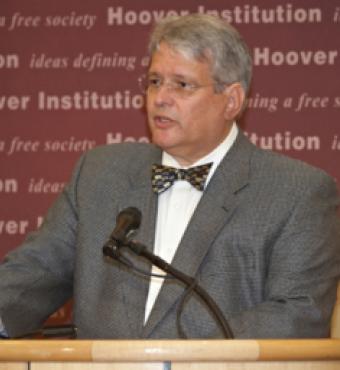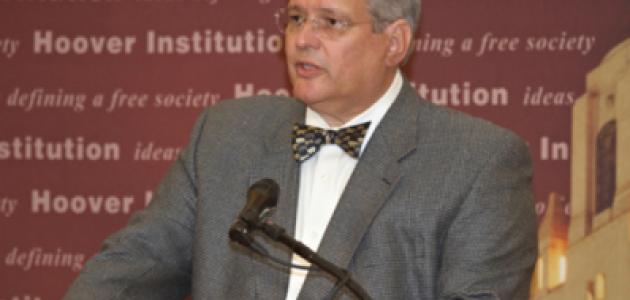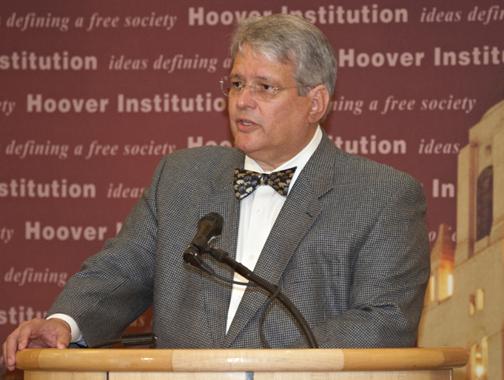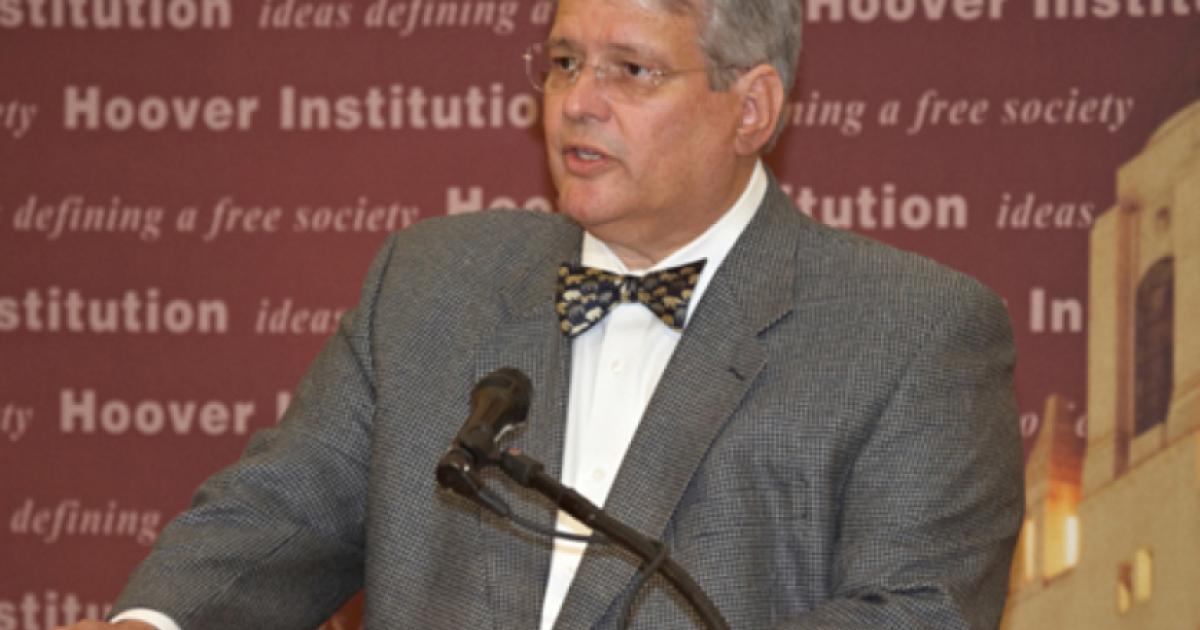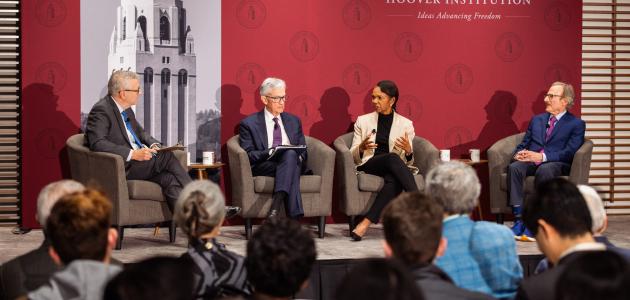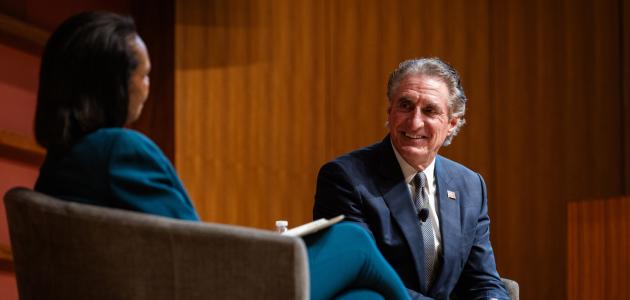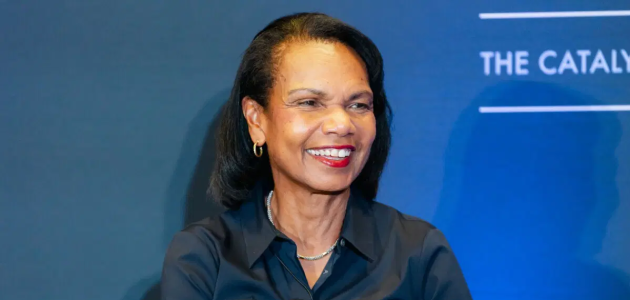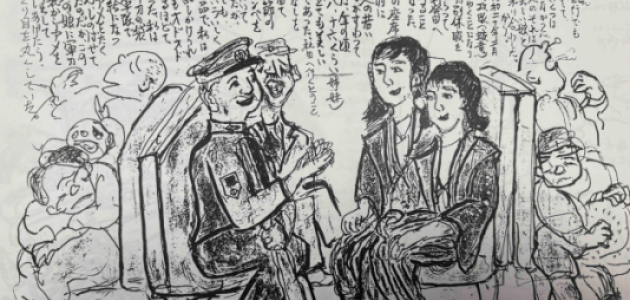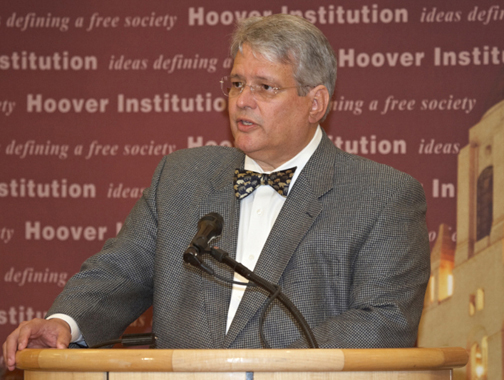
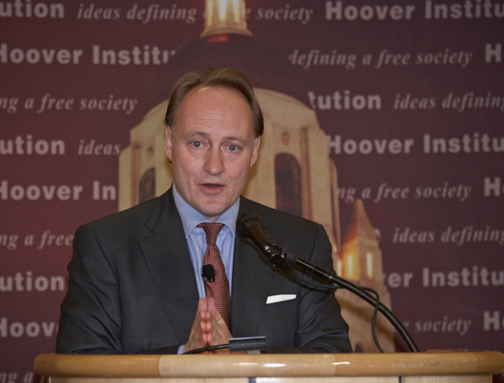
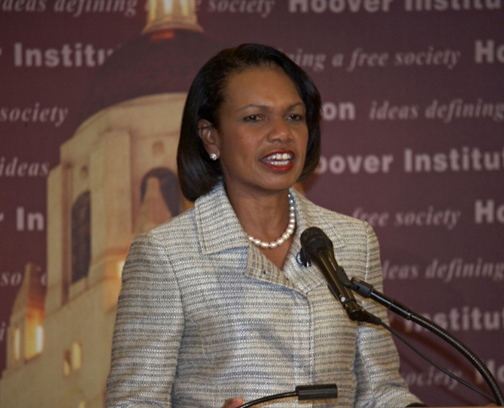
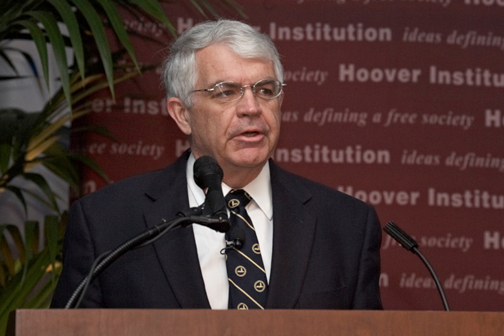
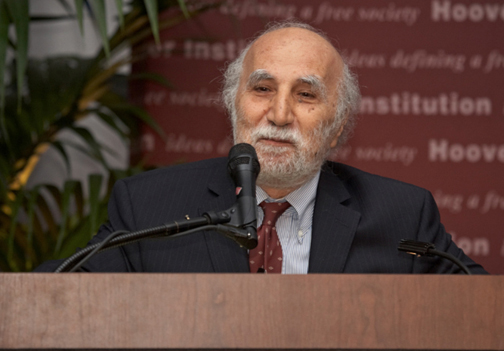
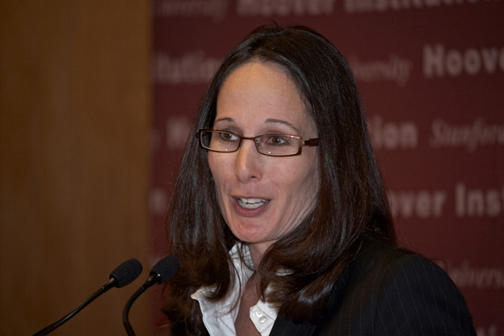
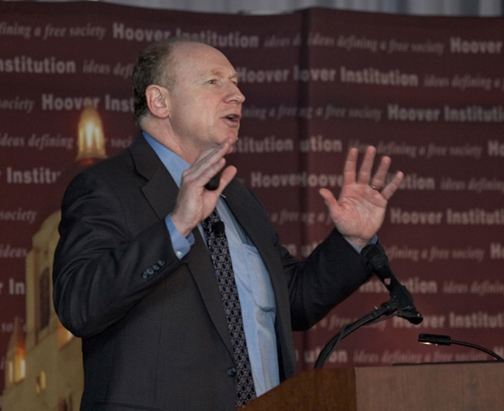
The Hoover Institution hosted its 47th annual retreat, beginning on Sunday, October 16, 2011, and ending on Tuesday, October 18, 2011. British historian Andrew Roberts discussed why the Germans lost World War II in his speech “A New Perspective on the Outcome of WWII: Why Hitler Lost.” In the course of his twenty-five years of research about WWII, Roberts explained that Hitler would always go “down the route of the Nazis,” placing “the ideologicial, fanatical, political beliefs that he had created above the best interests of the Wehrmacht.” He emphasized that this happened again and again during WWII. Roberts also said that Hitler believed that “the master German race would be superior to the conditions that were taking place in the Russian winter.” Roberts’s most recent book is The Storm of War: A New History of the Second World War (2011).
John Raisian, the Tad and Dianne Taube Director, gave welcoming remarks in which he discussed current events at Hoover on Monday morning, October 17, 2011. He highlighted Thomas Sargent’s Nobel Prize, the addition of distinguished visiting fellow Allan Meltzer and the Leadership Forum whose featured guests have included Paul Ryan, Eric Cantor, Tim Pawlenty, and Mitt Romney.
Monday morning sessions included a variety of topics, including economic principles, cyberwar and cyberespionage, the presidency, and a detailed look at the 2012 election.
John Taylor, the George P. Shultz Senior Fellow in Economics at the Hoover Institution, discussed the ideas from his upcoming book titled First Principles: Five Keys to Restoring America’s Prosperity. He defined economic freedom as “a situation where individuals, entrepreneurs, families, organizations are free to make decisions whether to buy, to sell, to hire, or to help people in a certain way.” He then described his five principles of economic freedom: “predictable policy framework, rule of law, strong incentives, market system, and limited role of government.” Taylor concluded by expressing the importance of applying those five principles to the crucial issues the United States faces today, including the debt explosion, monetary policy, and restoring leadership and strength.
Jack Goldsmith, the Henry L. Shattuck Professor of Law at Harvard University, disseminated his ideas on the cyberworld in his speech titled “Cyberwar, Cyberespionage, and National Security,” in which he explained how all computer systems are vulnerable to cyberexploitation, cyberattack, or both. He defined cyberexploitation as espionage or theft but with the operational systems remaining intact, whereas in a cyberattack a computer system is breached and the operational system is damaged. Goldsmith expressed three main points to explain the implications concerning this new issue of cyberwars. First is the idea that “offensive beats defensive” in cyber matters because computer systems are incredibly complex. Second, he spoke to the issue of how “distance and geography are obliterated” because computer systems are connected globally. Lastly, Goldsmith explained the attribution problem; in other words, “it’s impossible to figure out for sure who is responsible for an attack.” He also mentioned the flourishing black market, which adds to the serious nature of the problem.
Michael Boskin, senior fellow at the Hoover Institution, outlined a partial list of President Obama’s policies and the results of such policies in his talk titled “A Historic Presidency?” Some of the policies he described included the stimulus bill, Cash for Clunkers, foreclosure relief, higher tax proposals, health care reform, cap and trade, mandates, subsidies, moratoria, financial regulation, and serial union favoritism. Boskin went on to describe what he called the “Obama deficit quintet” of budget deficit and debt, growth deficit, jobs deficit, leadership deficit, and credibility deficit.
David Brady, Daron Shaw, and Frederick Yang concluded the Monday morning session with their talk titled “An Insider View of the 2012 Elections: Issues and Strategies.” David Brady, deputy director and Davies Family Senior Fellow at the Hoover Institution, introduced his fellow speakers, Shaw and Yang, and briefly discussed the “guns and butter” model, which says that “in the 2012 election President Obama will get 46.2 percent of the votes.” Yang, a partner with the Garin Hart Yang Research Group, discussed possible outcomes of the 2012 election according to professor Allan Lichman in his “13 Keys to the Presidency” and the Michigan Consumer Sentiment Index. He notes that the 2012 election will be a close race and could be decided by two states, Virginia and North Carolina. Shaw, the University Distinguished Teaching Professor in the Department of Government at the University of Texas, Austin, discussed three points: how rules matter in Republican nominations, how the economy dominates the presidential election, and how the pathway to the White House runs through the Rocky Mountains and the West.
Monday breakout afternoon sessions included a number of speakers. Scott Atlas, senior fellow at the Hoover Institution and a professor of radiology and chief of neuroradiology at the Stanford University Medical Center, spoke about “Health Care Reform: Setting the Record Straight on America’s Health Care.” Ken Jowitt, the Pres and Maurine Hotchkis Senior Fellow at the Hoover Institution and the Robson Professor of Political Science at the University of California, Berkeley, gave a speech titled “America: The Uncivil Society.” Amy Zegart, senior fellow at the Hoover Institution, talked about her new book Eyes on Spies: Congress and the US Intelligence Community.
Thomas Henriksen, senior fellow at the Hoover Institution, gave a talk on “Soldiers, Spies, and the ‘New’ American Way of War.” Abbas Milani, research fellow and codirector of the Iran Democracy Project at the Hoover Institution, spoke about “The Arab Spring and the Iranian Regime: Allies or Enemies?” Bill Whalen, research fellow at the Hoover Institution, gave a talk titled “The 2012 Election: It’s October, Any Surprises So Far?”
Anne Bayefsky, senior fellow at the Hudson Institute and a visiting fellow at the Hoover Institution, spoke on “The United Nations, Human Rights, and American Foreign Policy: The Downside of Outsourcing.” Keith Hennessey, research fellow at the Hoover Institution and a lecturer at the Stanford Graduate School of Business, gave a talk titled “What Will Washington Do This Fall on Stimulus and Deficits?”
On Monday evening, Condoleezza Rice, the Thomas and Barbara Stephenson Senior Fellow on Public Policy at the Hoover Institution and a professor of political science at Stanford University, gave before-dinner remarks titled “US Global Leadership?” In those remarks Rice described the meaning of global leadership as “the ability to set the agenda for the international system, the ability to condition the environment, and the ability to defend one’s interest.” She emphasized that “great powers are powers that have an idea and are willing to sacrifice in the short term for the long-term gains.” Rice then discussed ways in which we can strengthen US global leadership: “speaking clearly, finding who your friends are and who are not, and finding ways to challenge those friends, support seedlings, and reform the Defense budgets.”
On Tuesday, October 18, 2011, John Cogan, the Leonard and Shirley Ely Senior Fellow at the Hoover Institution and a professor in the Public Policy Program at Stanford University, discussed entitlements in his speech titled “American Entitlements: Can We Take the Road Less Traveled?” Cogan explained three parts in his talk including “the road well traveled (our current path), the size, scope and reach of the federal entitlement state, and what can be achieved by a few straightforward reform policies.” Cogan’s purpose is “to adopt simple, straightforward adjustments to our entitlements to achieve the desired outcome.” Using graphs and charts, he depicted the well-traveled road, which leads to “fiscal ruin” as seen in Europe’s current debt-to-GDP ratio, and showed how entitlements are the key driver of federal spending. Cogan’s proposed entitlement reforms include slow growth in benefits for new retirees (Social Security), higher copayments and more choices (Medicare), and block grants (Medicaid).
Fouad Ajami, senior fellow at the Hoover Institution and the cochair of the Herbert and Jane Dwight Working Group on Islamism and the International Order, talked about the Arab Spring in his speech titled “The Best Day after a Bad Emperor Is the First: Tracking the Arab Spring.” He discussed the current status of the six countries in play in the Arab Spring: Tunisia, Egypt, Libya, Yemen, Bahrain, and Syria. “In Tunisia and Egypt, the army refused to fire on the protesters, and the rulers left.” The trials of Hosni Mubarak began on August 3, 2011. “In Libya, after 40 years of tyranny by the madman Muammar Gaddafi, the Libyans got lucky and Gahdafi was sent packing. Yemen, Bahrain and Syria are still in play.” Yemen is the poorest of the Arab states and has a heavy Al Qaeda presence. Also, Yemen is the home of Anwar al-Awlaki, “a radical American-born Muslim cleric who became a leading figure in Al Qaeda's affiliate in Yemen” (New York Times) and inspired three of the nineteen boys of 9/11, in addition to Umar Farouk Abdulmutallab, the “Underwear bomber” and Faisal Shahzad, the Pakistani immigrant who tried to set off a car bomb in Times Square. In Bahrain, “there is something fundamentally wrong with the regime which condemns a person fifteen years to life in prison for people who administer medical aid to protesters.” In Syria, Ajami explains that “it’s not just the complication of politics, but it’s the complication of religion.”
Lee Ohanian, senior fellow at the Hoover Institution and professor of economics and director of the Ettinger Family Program in Macroeconomic Research at the University of California, Los Angeles (UCLA), discussed the lack of job growth in the United States and policies to restore jobs in his speech titled “Why Jobs Aren’t Returning in the United States--and What We Can Do about It.” Ohanian talked about why employment today remains depressed and “why jobs aren’t coming back.” “Government policy is affecting the labor supply, the incentives and opportunities individuals have to work, and labor demand, which is the incentives and opportunities private-sector businesses have to hire individuals.” He explained how extending unemployment benefits to ninety-nine weeks and mortgage modifications limit opportunities to find jobs. Ohanian concluded by describing policies to restore job growth including tax reform, reducing government spending from European levels, and revisiting ObamaCare and DoddFrank.
David Mamet, acclaimed playwright, screenwriter, film director, and essayist, spoke about some of his recent works including his book The Secret Knowledge: On the Dismantling of American Culture. He discussed the importance of free enterprise in show business and his experiences working in that field for the past forty-five years. After reading White Guilt by Shelby Steele, Mamet described his path toward becoming a Conservative Jew. He also mentioned a play he wrote titled November about life in the White House. “There must be civility in discourse,” Mamet stated. Some of his most noted works include the films The Untouchables, The Verdict, and Wag the Dog.







